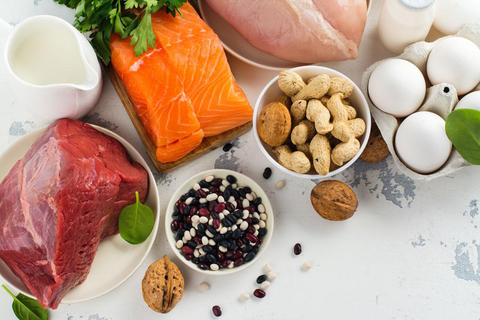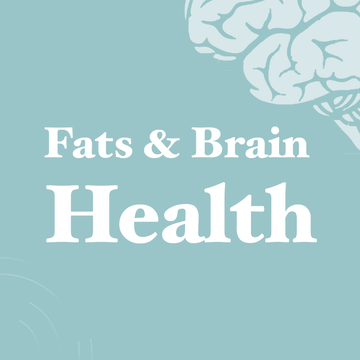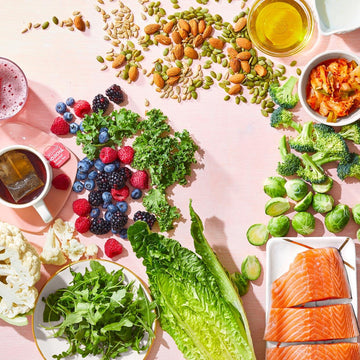
We are all concerned to some degree about any decline in our overall mental performance, memory and cognition. We can visibly see this spectrum with our aged population ranging from those who are super witty or ‘still with it’ to those who unfortunately suffer with cognitive ailments such as Alzheimer’s and dementia.
Prenatally, there is a positive association between the maternal intake of micro-nutrients such as folate, vitamin B12, omega-3 polyunsaturated fatty acids and iron, and cognitive outcomes in the resulting children. So if these options are good for our babies, then in turn, what can we do to support our mental health as adults? What health optimization practices can we implement in order to prevent or slow down the declines in both cognitive function and performance?
Back in 1955, the world opinion of heart health shifted. That shift translated to decades of decreased fat consumption in order to ‘save your heart’. As that decline of heart disease took place, the rise of a new physiological epidemic began to rise. Although undetectable or invisible at first, rates of brain disease and memory impairment begin to rise. The scientific link between lowering your cholesterol and your brain weakening, became painfully evident.
Current evidence suggests, that key nutrients for optimal cognition include omega-3 fatty acids such as docosahexaenoic acid as well as dietary methyl donors such as B vitamins.
Your brain requires specific nutrients and neurotransmitters in order to properly transmit signals from cell to cell or from your brain to the rest of your body. Neurotransmitters govern the brain, controlling everything from memory and IQ, to mental energy to even our moods to sexual health/libido. The brain relies or feeds off nutrients from your food in order to make neurotransmitters.
Throughout your life, the dietary supplementation of methyl donors such as folate, vitamins B6 and B12, choline and methionine are essential for optimizing growth and physiological function.
One of the main brain nutrients from foods is choline as a large part of your brain tissue is comprised of it. Not just brain health, but choline plays a role in muscle control, metabolism, liver health and more.

Choline is essential for maintaining normal levels of acetylcholine which helps to boost your memory and overall brain performance. There is a plethora of research explaining choline’s role in boosting dopamine – the neurotransmitter that allows you to feel pleasure or be in a “good mood”, as well as norepinephrine, a neurotransmitter crucial for attention and focus. When necessary, it will also increase your brains production levels of ATP (high energy fuel). Aside from high energy fuel ATP is also present in order to protect your brain from free radical damage and age related shrinking by helping to build new tissue!
When it comes to choline, it is recommended that women consume 425 mg a day, men 500mg. Some of the best sources of choline are grass-fed, free-range eggs and good quality and high fat dairy. One egg, based on quality of the egg, could provide up to 164mg of choline. Today’s caged, mass-produced eggs and hyper-pasteurized dairy products contain far fewer nutrients than they’re supposed to. These factory-produced egg and dairy products are contaminated with pesticides, hormones and other chemicals that may make your brain performance far from optimal. You could be deficient if you have experienced any feelings or affects such as; memory lapses, brain fog, difficulty concentrating or paying attention then you could simply be deficient in the proper supplementation. If you have been following a low fat lifestyle, you may notice some of these aforementioned deficiencies.
Bonus, eggs provide some of the other essential nutrients for optimal brain health such as B12, B2 and proteins.
An example of brain nourishing meals for a day could consist of:
BREAKFAST:
2 eggs over-easy, with sautéed spinach, mushrooms, onion, topped with nuts or seeds of choice. Paired with your coffee with AURA’s Collagen + MCT powder, double bonus!

LUNCH:
Savoury oatmeal with berries on the side. (See recipe below)
- ½ cup steel cut oats, or large oats
- 2 tbsp sun-dried tomato (chopped)
- 1 tbsp pesto
- 1 tbsp parmesan cheese
- 1 pinch sea salt
- 1 pinch black pepper
Prepare oatmeal according to package directions. In a bowl, mix together oatmeal, sun-dried tomato, pesto, Parmesan, sea salt and black pepper.
Credits: The New York Times. Food Stylist: Monica Pierini.
DINNER:
Sheet pan salmon, beets, broccoli and onions. Spiced with salt, pepper, turmeric. Once cooked, drizzle olive oil on top.
Cara Janzen, H. BSc. RHN is an AURA Community member with a belief to help make you rich – nutritionally! As a Registered Holistic Nutritionist, she is equipped with a B.Sc. and have a background in Biological Sciences and Psychology.
References:
Martinet, M., P. Fonlupt, and H. Pacheco. "Effects of Cytidine-5' Diphosphocholine on Norepinephrine, Dopamine and Serotonin Synthesis in Various Regions of the Rat Brain." Arch Int. Pharmacodyn Ther. (1979): 52-61. Web.
Plataras, Christos, Stylianos Tsakiris, and Panagoula Angelogianni. "Effect of CDP-choline on Brain Acetylcholinesterase and Na ,K -ATPase in Adult Rats." Clinical Biochemistry 33.5 (2000): 351-57. Web.
Zeisel, Steven H. "Nutritional Importance of Choline for Brain Development." Journal of the American College of Nutrition 23.Sup6 (2004): 621S-26S. Web.
Samman, Samir, Fan Piu Kung, Lissa M. Carter, Meika J. Foster, Zia I. Ahmad, Jenny L. Phuyal, and Peter Petocz. "Fatty Acid Composition of Certified Organic, Conventional and Omega-3 Eggs." Food Chemistry 116.4 (2009): 911-14. Web.
Dauncey, MJ. “Nutrition, the brain and cognitive decline: insights from epigenetics”. European Journal of Clinical Nutrition (2014) 68, 1179–1185.








